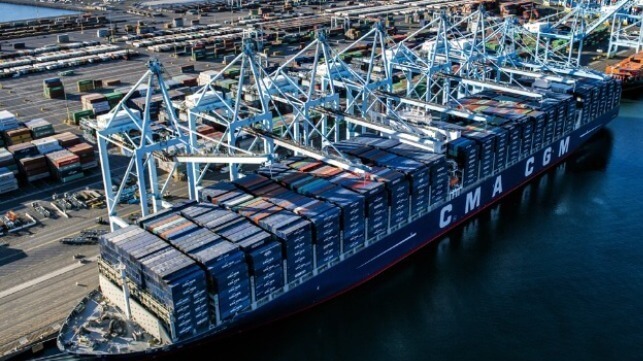Environmental Coalition Calls on Retailers to Cut Shipping Emissions

A coalition of environmental NGOs is working to decarbonize container shipping by applying pressure to the largest U.S. retailers, who are among the biggest customers for the ocean freight industry.
In a report released last month, the Ship It Zero coalition shows that goods imported via maritime shipping to the U.S. by Walmart, Target, Amazon and IKEA between 2018–2020 accounted for an estimated 20 million tonnes of carbon dioxide equivalent emissions (CO2e). These goods were predominantly shipped by a small group of leading ocean carriers, which have long-term relationships with each of the retailers.
“There is now a moment of opportunity where record breaking profits for retailers and cargo carriers are at a nexus with increasing consumer demand for emissions-free shipping, opening up new avenues and increasing motivation for the decarbonization of the container fleet,” states the report by Stand.Earth and Pacific Environment.
Walmart topped the list of companies with the highest volumes traded and the most emissions. The retailer is also the number one goods importer in the U.S. The report shows that Walmart emitted an estimated 11.5 million tonnes of CO2e to ship 2.7 million TEUs between 2018 and 2020.
CMA CGM was Walmart's main carrier over the course of 2020, accounting for 68 percent of the retailer’s shipping emissions.
Target emitted around 6.4 million tonnes of CO2e over the same period to ship an estimated 1.8 million TEUs. Amazon.com emitted an estimated 1.5 million tonnes of CO2e to ship approximately 463,500 million TEUs of goods, and IKEA emitted 1.3 million tonnes of CO2e to ship 425,201 TEUs.
IKEA was the only top retailer to post a reduction in emissions, which have been on an overall downward trend. Its emissions fell by 16 percent between 2018 and 2019 and a further 8.5 percent between 2019 and 2020.
The shipping industry accounts for nearly three percent of the world’s greenhouse gas (GHG) emissions. This is more than the emissions from global air travel and equivalent to the annual electricity usage of almost 200 million homes.
